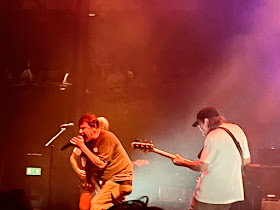"Won't you bury my body down. Down in the cold, cold ground" - The Hand Of Fanny Johnson.
Last week I took a bit of a chance on a gig. My friend, and former PRS colleague, Dave Fog asked me if I'd be interested in joining him at Cecil Sharp House to hear the black folk singer Angeline Morrison and her band run through their new album The Sorrow Songs:Folk Songs of Black British Experience.
Released recently, on Topic records, it's a project that came about when Morrison, a songwriter and academic residing in Cornwall but born in Birmingham to a Jamaican mother and a Scottish father, realised that though many black people like, love, folk music often folk music doesn't love them back. At least not in the form of songs and stories about their own life.
She decided to rectify that and, via what appears to be very extensive research, she discovered stories about the black British experience and tales of black people who had lived in the UK in centuries past. Most of the stories she discovered weren't fully realised so she's had to use a bit of artistic license to put the songs together but that simply adds to both the charm and power of the project.
Morrison's got a great voice and a commanding stage presence. She plays the autoharp and she's backed by a three man band consisting of Cohen Braithwaite-Kilcoyne (anglo concertina), Clarke Camilleri (banjo and guitar), and Hamilton Gross on violin. Each one of them chips in on backing vocals, as well as some good time folky clapping along, and each one of them is uniformly excellent.
On the album, there are interludes where white British people of days gone by express their racist views but, probably thankfully, that's not part of the gig. Instead we just get Angeline introducting the songs, telling us where they're from (there's at least a couple from Wales and one from Redruth in Cornwall) and then the band playing the songs. Sometimes accompanied by enthusiastic clapping and singing from the crowd.
It is, after all, a folk gig. Songs like Unknown African Boy, Cruel Mother Country, and Mad Haired Moll O'Bedlam are tender to the point of almost unbearably poignant while slightly more uptempo tunes like Black John can hardly fail to get the foot tapping (it was a sit down gig). Others, like Cinnamon Water are simply and plainly gorgeous.
The Hand Of Fanny Johnson was the most rambunctious and infectious song of the night (and something of an earworm to boot) but perhaps the most powerful part of the set was the closing coda of Go Home (a common phrase that racists like to use) and Slave No More. Go Home was played at an almost funeral pace as Angeline's band intoned the title while Angeline herself told of Britain being the only home that she, or the person whose spirit she was evoking in the song, had ever known.
Slave No More almost felt as if a spiritual. Though a spiritual birthed in the West Midlands and grown up in Cornwall rather than the cotton fields of Alabama. It, of course, ended in a standing ovation and a quick encore of a Ewan MacColl song whose title, annoyingly, escapes me now. In an hour and a half performance, though one that built on over a year's work, Angeline Morrison managed to write a new chapter not just for British black folk music but for British folk music in general. Both the album and the gig were, and are, as vital as they are necessary.
Thanks to Cecil Sharp House (a fantastic venue), thanks to Maddie Morris (above) for a brilliant and enthusiastic supporting set, thanks to Namaaste for tasty zardaloo kofte beforehand, and thanks to Dave F for both the gig tickets and paying for the meal (crucial to me at a time I'm beginning to find myself in financial dire straits) as well as being top company for a lovely night out. Thanks, most of all, though to Angeline Morrison and her fantastic band.

























































